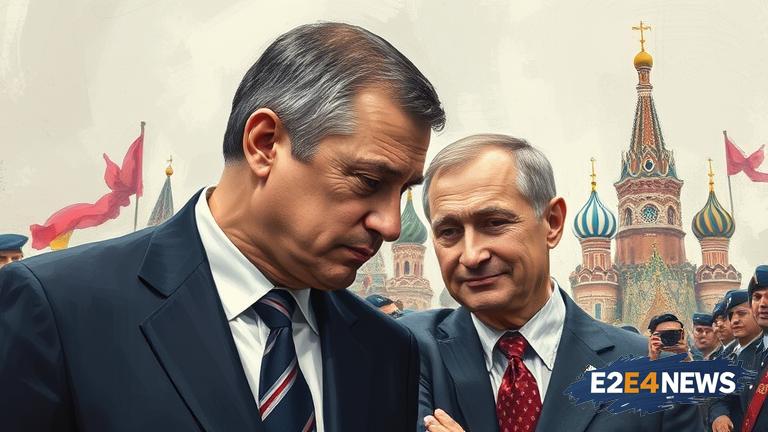The relationship between Russia and Serbia has been a subject of interest in recent years, with Moscow’s influence in the Balkans being a significant factor in the region’s politics. According to a recent report, Moscow believes that its support is crucial for the survival of Serbian President Aleksandar Vučić. The report suggests that Vučić’s political fate is closely tied to Russia’s backing, and that without it, he may struggle to maintain his position. This assessment is based on the understanding that Vučić’s government has been facing significant challenges, including opposition from Western countries and internal political pressures. Russia’s support has been a key factor in helping Vučić navigate these challenges, and Moscow believes that its continued backing is essential for his survival. The report also highlights the importance of Russia’s economic and military support for Serbia, which has helped to strengthen Vučić’s position. However, the report also notes that Vučić’s reliance on Russia’s support has created tensions with other countries in the region, particularly those that are aligned with the West. Despite these tensions, Moscow remains committed to supporting Vučić, and believes that its backing is essential for maintaining stability in the region. The report also suggests that Russia’s support for Vučić is not just about maintaining its influence in the Balkans, but also about promoting its own interests in the region. Russia has significant economic and strategic interests in the Balkans, and its support for Vučić is seen as a way of advancing these interests. However, the report also notes that Russia’s support for Vučić has created concerns among other countries in the region, particularly those that are concerned about Moscow’s growing influence. The report highlights the complex and nuanced nature of the relationship between Russia and Serbia, and the challenges that Vučić faces in maintaining his position. It also notes that the situation in the Balkans is highly fluid, and that the outcome of the current situation is far from certain. In recent years, the Balkans have been a focus of attention for Russia, which has sought to expand its influence in the region. Moscow has used a range of tools to achieve this goal, including economic and military support, as well as diplomatic efforts. The report suggests that Russia’s support for Vučić is just one part of a broader strategy to expand its influence in the Balkans. However, the report also notes that this strategy has created tensions with other countries in the region, particularly those that are aligned with the West. The situation in the Balkans is highly complex, and the outcome of the current situation is far from certain. The report highlights the need for a nuanced understanding of the relationship between Russia and Serbia, and the challenges that Vučić faces in maintaining his position. It also notes that the situation in the Balkans is likely to remain a focus of attention for Russia, and that Moscow’s support for Vučić will continue to be an important factor in the region’s politics. The report suggests that the future of the Balkans will be shaped by a range of factors, including the relationship between Russia and Serbia, as well as the interests of other countries in the region. It also notes that the situation in the Balkans is highly fluid, and that the outcome of the current situation is far from certain. In conclusion, the report highlights the importance of Russia’s support for Vučić, and the challenges that he faces in maintaining his position. It also notes that the situation in the Balkans is highly complex, and that the outcome of the current situation is far from certain. The report suggests that the future of the Balkans will be shaped by a range of factors, including the relationship between Russia and Serbia, as well as the interests of other countries in the region.
